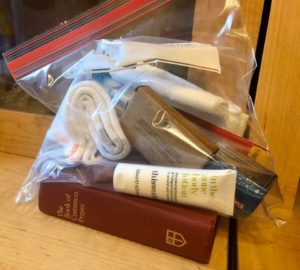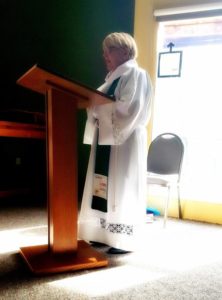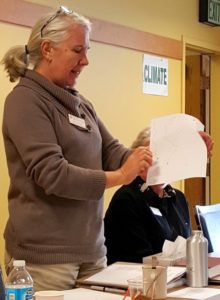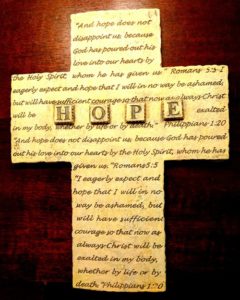Province II continues to serve in the midst of Covid-19 pandemic
Jennifer Kenna, Province 2 Representative
National Board of Episcopal Church Women
As I write this article, I hold in my heart many of our ECW members in the New York City, Long Island and New Jersey communities where COVID-19 is running rampant – it is the national epicenter of the virus outbreak. Therefore, my information is limited but there are some bright spots.
Diocese of the Virgin Islands ECW President Edith Haynes-Lake reports that all of their ECW groups continue to hold all those affected by this deadly outbreak in their prayers,” covered by the saving embrace of Jesus Christ.”
Diocese of Central New York – my home diocese. St. Matthew’s Church, Liverpool, just outside of Syracuse, NY continues to be actively ministering in the midst of this pandemic.
Making Masks
 Several of our parishioners have been making face masks, a great project for folks with sewing skills and time on their hands. Some patterns and information about people and agencies looking for masks can be found here: syracusemaskproject.org. If you make masks for parishioners, they can be left at the drop-off spot at church. Penny Dugas and Linda Chambers are happy to answer questions and provide advice for people who would like to make masks. Many thanks to Penny and Linda for their donation of masks for use by parishioners; they can be picked up in the drop-off spot at church as they are available. Let me know if you need one and we’ll figure out a way to get it to you.
Several of our parishioners have been making face masks, a great project for folks with sewing skills and time on their hands. Some patterns and information about people and agencies looking for masks can be found here: syracusemaskproject.org. If you make masks for parishioners, they can be left at the drop-off spot at church. Penny Dugas and Linda Chambers are happy to answer questions and provide advice for people who would like to make masks. Many thanks to Penny and Linda for their donation of masks for use by parishioners; they can be picked up in the drop-off spot at church as they are available. Let me know if you need one and we’ll figure out a way to get it to you.
Do you know anyone who could use some help?
Thanks to everyone who has generously donated food and supplies to our Emergency Food closet and the Samaritan Center. Last week, The Outreach Committee delivered food to the Liverpool Central School District’s food pantry, personal items to the North Syracuse Central School District’s pop-up food pantry, and supplies to the Samaritan Center for their to-go meal program. If you know of anyone in our congregation or in the community who could use a couple of bags of emergency food, please let me know.
They are caring for each other and those outside the walls in many ways. All three Diocese of Central New York delegates to Triennial 2021 are from St. Matthew’s.
Diocese of Long Island
From the Diocese of Long Island, President Lois-Johnson Rodney sends sad news that in her parish alone there are 5 deaths per week. Her husband Dennis was hospitalized for 2 months with COVID-19, but thankfully has been sent recently to rehab. Our prayers continue for Dennis and all those in LI suffering from the effects of this deadly virus.
Diocese of New Jersey
We are planning a “virtual” UTO Ingathering and Annual Meeting! With the expert help of our ECW Chaplain, Rev. Amy Cornell, and our Worship and Spiritual Development Chair (and Acting Vice President), Allie Graham, we will soon be publicizing information on how our ECW around the Diocese can participate via Zoom, either with a computer, smart phone, or even by plain old regular phone! All will be able to join in! The date and time are the same as previously announced; June 6, 2020, beginning at 10:00 AM. We are pleased that The Rt. Reverence William Stokes will be joining us during this event also, and we will get registration information out to all parishes in the next week or so.
The Diocese of NJ ECW will also award their annual Student Service Awards, monetary gifts presented to deserving high school seniors and underclassmen in honor of their service to the church and the world. This year, the board also voted to return to publishing a yearbook!
“Episcopal Church Women in the Diocese of New Jersey, and indeed, around the world, are working to help others during these trying times, whether sewing face masks, leading on-line prayer groups and bible studies, calling shut-ins, feeding the hungry, or being prayer warriors, we are serving as we discern God calling us to do. It is often the worst of times that shine a light on the best in people, and that is especially true of our Episcopal Church Women!” (quoted from the report of Diocesan President Donna Freidel).
Province 2 ECW had looked forward to holding their annual meeting in the Diocese of the Virgin Islands, hosted by their ECW groups, under the leadership of President Edith Haynes-Lake and in collaboration with Dianne Roberts, Diocese of New York and Vernese Smith, Diocese of Long Island, who worked long and hard to make arrangements. Since that will not be possible due to the COVID-19 pandemic, plans are in the works to hold a “virtual” Province 2 ECW meeting in the next few weeks, as there is business to be tended to.
Please continue to hold in prayer all those in the dioceses of New York, Newark, New Jersey and Long Island especially as they struggle through the deep waters of this painful time in our lives.





 Four prayers and blessings from Jennifer Kenna
Four prayers and blessings from Jennifer Kenna From “The Essene Book of Days” by Danaan Parry
From “The Essene Book of Days” by Danaan Parry “WALK IN BEAUTY”
“WALK IN BEAUTY” As we pause to feed our bodies in the middle of the day, we pause also to feed our souls by vowing again to live faithfully.
As we pause to feed our bodies in the middle of the day, we pause also to feed our souls by vowing again to live faithfully.